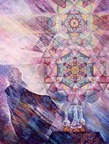
Depression and anxiety are at
an all time high and continually on the rise in our modern
society, and unfortunately the medical profession generally
turns to medications that are dangerous with severe
side-effects. If you know someone who has been prescribed
some of these medications, please educate yourself and them
so they know how to get off of these drugs safely. I have
included 3 transcripts of training tapes below that include
information by Dr. Ann Blake Tracy, an expert on the
dangers of these medications. These were presentations at
the Young Living conventions. Click on the links below to
download the transcript onto your computer.
(to purchase these tapes available from Essential Science
Publishing - see Resources for a link)
There are many Young Living essential oils that support
emotional well-being and can help with depression,
depending on the particular circumstances. To name a few:
Joy
Frankincense
Citrus oils - Tangerine, Lemon, Grapefruit, Orange
Peace & Calming blend
Hope
Lavender
Awaken
Clarity
Sacred Mountain
Valor
Harmony
Clary Sage
All the essential oils (we are speaking, as always, only
about therapeutic quality oils, such as Young Living
Essential Oils) bring oxygen into the cells, and all
depressions have a component of lack of oxygen. The oils
that are highest in sesquiterpenes have the highest
capacity for bringing oxygen into the cells. Balsam fir,
frankincense and the pine oils are all very high in
sesquiterpenes. Essential oils cross the blood brain
barrier, and immediately affect the emotions through the
limbic area of the brain, and can help moods tremendously.
Of course, emotional healing is an important part of trauma
recovery and the release of unconscious patterns that hold
us in limitation or stuck in painful beliefs. There are
several systems that I use to help facilitate such healing,
and there is good work available through many different
kinds of systems. Please see Emotional Healing for further
information.
For those who need to get off of prescription medications
and be supported in recovery from unbalanced brain
chemistry, there are supervised clinics that do not use
drugs. See information below. Proper nutrition and
supplements play a key role in helping to support our
bodymind, and especially when coming off these medications
or balancing out the chemistry to address the crisis that
land people in situations where they would unsuspectingly
turn to these medications. Please check out the following
books as resources if you are helping someone get off of
the antidepressant drugs or antianxiety drugs, or for
professional help from these authors, and educate your
doctor if they are not aware of this information:
Depression-free,
Naturally by Joan Mathews Larson (Dr.
Larson also has a clinic in Minneapolis - Health Recovery
Center, 1-800-554-9155).
The
Diet Cure by Julia Ross (www.dietcure.com
/ clinic in Mill Valley, CA: 415.458.8446)
Prozac,
Panacea or Pandora by Dr. Ann Blake Tracy (also,
check her website: www.drugawareness.org for how to order
her book or audiotape: Help, I can't get off my
antidepressants!) Dr. Tracy also promotes the use of Young
Living Essential Oils in her treatment.
YL_TrainingTape_44
YL_TrainingTape_59
YL_TrainingTape_63
Enthusiasm
( en=in; theos=God)
Sharing
this quote from the book: 'Music of the Mind' - Darryl
Reanney (Biddles, Ltd.)
“...A revelatory story is emerging from modern
science, a story which no longer sees human beings as
accidental side issues in a mechanical universe but as
co-creative participants in an adventure-driven mystery. At
the centre of this evolving story is the ethic of
interconnectedness; science is now validating the central
insight of the sacred tradition, ‘all is one’,
showing that the part has no meaning outside the whole,
that to explain anything you have to explain everything.
For society, the problem is that science is changing much
faster than the attitudes it gave rise to. While the
machine paradigm fades from science itself, it lingers
stubbornly in the social and intellectual conventions that
still look to science for their endorsement. Thus the human
body is still spoken of in the language of mechanism,
psychiatric treatment still relies heavily on palliatives
and tranquillizers, and we deny the role of touch - the
most reassuring and healing of all human interactions- in
the very areas we need it most. We do all these things
because we have forgotten what our ancestors knew at a deep
level, that no society can be whole while any one of its
member parts is damaged; any music ceases to be harmonic if
a single note is off-key.
I believe society is sick, at least in part, because we
have lost the ‘story’ that bound us together.
It is part of our human necessity that we need to be
animated by some deep sense of common purpose, of shared
meaning, if our lives are not to become pointless
irrevelencies. Without an underpinning foundation of
explanatory story, we find it hard to experience enthusiasm
in the true sense of its original meaning - being en
theos.”
